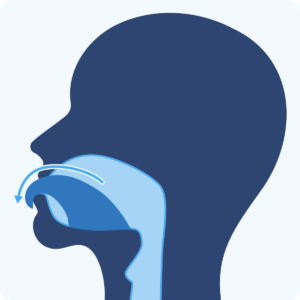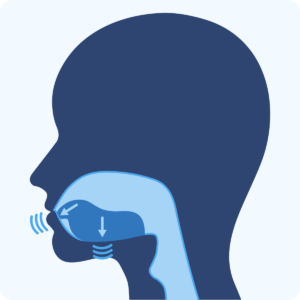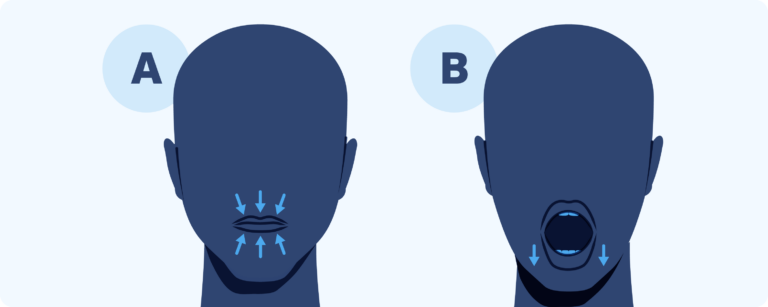While lifestyle changes and medical devices are primary treatments for OSA, mouth and throat exercises can be a helpful complementary approach, especially for mild snoring [1]. Here, we'll explore some exercises to strengthen the muscles that keep your airway open during sleep, helping you breathe easier and sleep better.
Disclaimer: These exercises are not a guaranteed cure for snoring or OSA. If you suspect OSA, consult a doctor for proper diagnosis and treatment.
Why do we snore and/or have sleep apnea?
-
Relaxed Muscles: During sleep, the muscles that support your throat relax. This can cause the soft tissues like the uvula, soft palate, and tongue base to vibrate as air flows past them as they become more floppy. If this gets to the extend that the airway closes on it self for brief periods it leads to sleep apnea. Here we explore how to strengthen the muscles supporting these soft tissues.
-
Narrowed Airway: Certain anatomical factors can narrow your airway even when muscles are relaxed. These include a large tongue, enlarged tonsils or adenoids, a deviated septum (misaligned wall in the nose), or a naturally narrow throat. This can sometimes be treated with surgery, if you believe this is the case please consult your doctor.
-
Increased Airflow Velocity: When the airway is narrowed, air has to move faster to get through. This faster airflow creates more vibration of the relaxed tissues, leading to the characteristic sound of snoring.
What mouth and throat exercise can we do strengthen your snore Defense: Exercises for a Better Night's Sleep.
Tongue Exercises:
This exercise strengthens the tongue and throat muscles and is one of the pillares of the mouth & throat exercises, which can help keep your airway open during sleep. Here's how to do it:
- Sit upright with good posture.
- Place the tip of your tongue on the back of your upper front teeth (where the gum meets the teeth).
- Slowly slide your tongue backwards, moving the tip along the roof of your mouth for several seconds.
- Slide your tongue forward to return to the the starting position.
- Repeat 5-10 times.

Stretching and strengthening the tongue muscles can help improve airway patency during sleep. Here are the steps:
- Sit upright with good posture
- Stick your tongue out as far as you can. Try to touch your chin or nose with the tip of your tongue.
- Hold for 10 seconds
- Relax and return your tongue to a resting position.
- Repeat 5 times.

This helps improve both tongue and soft palate tone and strength. [2]
- Sit upright with good posture
- Push your tongue upwards against the roof of your mouth.
- Press your entire tongue against the roof and hold for 10 seconds.
- Repeat 5 times.

This helps improve both tongue and soft palate tone and strength. [2]
- Sit upright with good posture
- Put the tip of your tongue against your lower front teeth.
- Push the back of your tongue flat against the floor on your mouth.
- Hold this position for 10 seconds.
- Repeat 5 times.

Jaw Exercises:
Jaw stretches improve tone and strengthen the jaw, facial, and throat muscles, and a pillar of mouth & throat exercises which can help maintain an open airway. Here's how to do them:
- Sit upright with good posture.
- Tightly close your mouth, pushing your lips as if you'r giving a kiss.
- Open your mouth wide, relaxing your jaw and lips as much as possible.
- Repeats 10 times.

Throat Exercises:
This exercise targets the pharyngeal muscles in the back of your throat, which can help keep your airway open and is one of the essential mouth & throat exercises. Here's how to do it:
- Sit upright with good posture.
- Open your mouth wide and stick your tongue out as far as possible.
- Hold for 10 seconds, focusing on slight stretch in the back of your throat.
- Relax and return your tongue to a resting position.
- Repeat 5 times.
Humming engages the muscles in your throat, which can help strengthen and tone them. Here are the steps:
- Sit upright with good posture.
- Close your mouth and hum for 30 seconds. Make a low-pitch humming sound, feeling the vibration in your throat.
- Repeat 3 times
Singing
Singing activates multiple muscles in the mouth and throat and involves pronouncing diverse sounds, including vowels [2] . Preliminary research has found that focused singing training may cut down on snoring [3][4]. When singing, try to focus on repeating and forcefully pronouncing individual sounds rather than just singing normal lyrics.
Additional Tips:
-
Consistency is Key: Aim for daily exercise sessions, ideally in the morning or evening. Consistency is crucial to see results, so find a routine that works for you.
-
Start Slow and Gradually Increase: Begin with a few repetitions of each exercise and gradually increase the duration and intensity as your muscles strengthen. Don't push yourself too hard, especially when starting.
[1] De Felicio, C.M., da Silva Dias, F.V., Voi Trawitzki, .LV. (2018) Obstructive sleep apnea: focus on myofunctional therapy. Nature and Science of Sleep, 10:271-286. [https://www.ncbi.nlm.nih.gov/pmc/articles/PMC6132228/]
[2] Eric Suni, Kimberly Truong (2023) Mouth And Throat Exercises to Help Stop Snoring and Improve OSA [https://www.sleepfoundation.org/snoring/mouth-exercises-to-stop-snoring]
[3] Ojay, A., & Ernst, E. (2000). Can singing exercises reduce snoring? A pilot study. Complementary therapies in medicine, 8(3), 151–156. [https://linkinghub.elsevier.com/retrieve/pii/S0965229900903765]
[4] Hilton, M. P., Savage, J. O., Hunter, B., McDonald, S., Repanos, C., & Powell, R. (2013). Singing Exercises Improve Sleepiness and Frequency of Snoring among Snorers—A Randomised Controlled Trial. International Journal of Otolaryngology and Head & Neck Surgery, 02(03), 97–102. [http://www.scirp.org/journal/doi.aspx?DOI=10.4236/ijohns.2013.23023]








